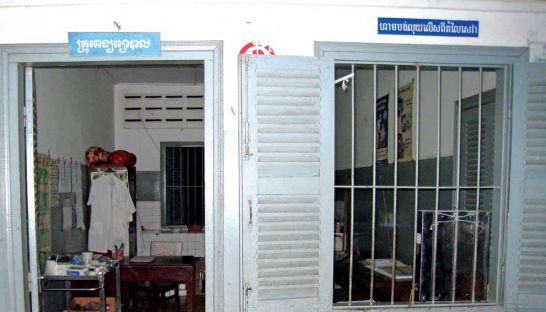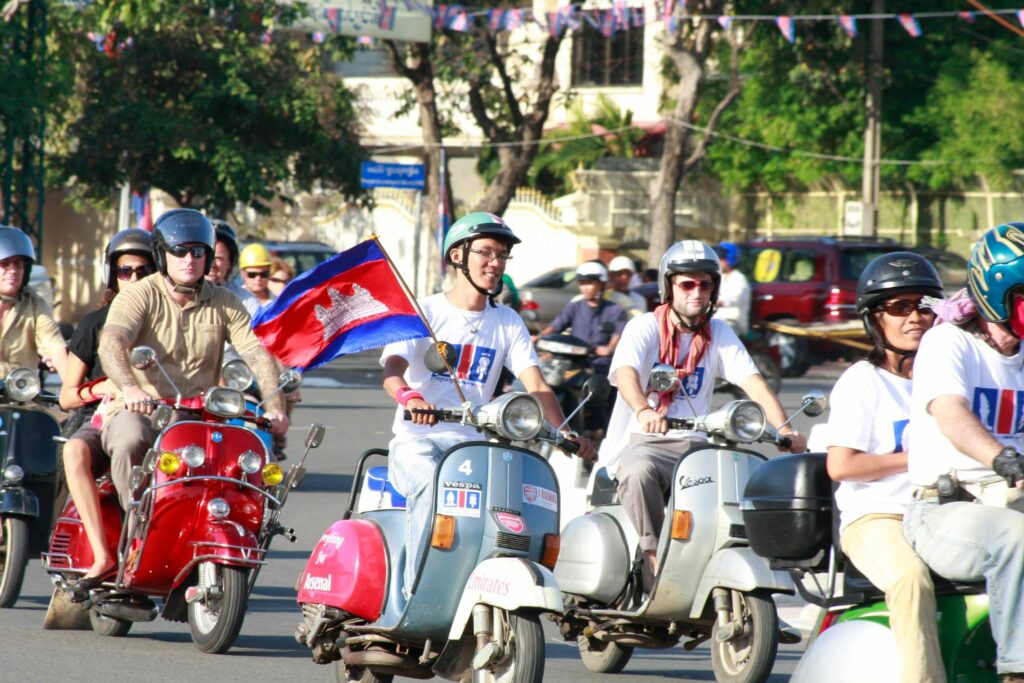Unofficial Translation from The Phnom Penh Post’s Khmer edition
TUESDAY, 15 MARCH 2016,
TONG SOPRACH
ការធ្វើវិមជ្ឈការសុខាភិបាលអាចជួយកែឥរិយាបថគ្រូពេទ្យ និង ពង្រឹងប្រព័ន្ធបានល្អប្រសើរ

The problems being faced by the Ministry of Health are not to some extent different from those faced by the Ministry of Culture and Fine Art. Cinemas and theaters are being sold, while how the money has been used remain anonymous. Some of the structures stays empty, waiting for the big customers. The old people, who are supposed to play the main role in the prevention of erosion in “significant and prosperous” Khmer culture are passing this responsibility to teenagers, exemplified by the campaign under the slogan: “Youth is the pillar of culture” on 3rd March.
With such a direct approach, how could today’s youth be confident in their relatively new responsibility while they have no important role in cultural development?
Similarly, health facilities have also been the “the goods for purchase”. Those include the Dombon Bei Hospital along Charles de Gaulle Blvd, 1st May Hospital (Police Hospital), Chinese Hospital, and The National Center for HIV/AIDS, Dermatology and STD Control (NCHADS) building, National Health Promotion building. While, the Cambodian Red Cross referral hospital (near the Independence Monument) was also sold to a commercial bank while CRC officials stay silent. Ministry of Health is no exception.
The Municipal hospital would have suffered the same result unless its workers called a strike. In spite of such good deals, the doctors’ and medical workers’ wages remain “peanuts”, leading to unprofessionalism in the field.
The leaders keep saying they were longing for “reform”, as Prime Minister Hun Sen called for the line ministries to improve Decentralization and Deconcentration (D&D) through transferring functions and resources to sub-national administrations in 2016. Yet, little has been done regarding this issue.
Furthermore, our health sector has survived due to international aid. Some of those donations were involved in corruption, exemplified by the findings from the Global Fund organization in the budget to buy the anti-malaria mosquito net (a long-lasting insecticide treated net LLIN) in 2014.
Yet, some health-related problems result from the custom official’s and economic police’s lack of attention from relevant institution on quality controls in medicines and foods. Consuming those hazardous medicines and foods leads to people dying, but many are unfairly pointing their fingers to the doctors for their suffering. Making the matter worse, the sale of referral hospital facilities (which covered 100,000 population). This will impact the voters for coming up commune election in 2017 and the national election in 2018.
A few years ago, the Premier ordered to pass all the medical doctor students who failed to acquire the standard passing grades after the two protests they had made.
These are the example of an outside problem, which will lead to badly impact Cambodia´s health sector. If we compare Health Minister Mam Bun Heng to Education Minister Hang Chuon Naron, whose works are closely tied to communities, HE Naron is obviously more active. Besides cutting the ribbons in inaugural ceremonies and give the gifts to people, what has the Health Minister of Cambodia actually done?
Regarding the HIV outbreak in Roka commune in Battambang province, which resulted in 280 people affected with HIV/AIDS and 10 deaths, the clear cause was the lack of capability in mentoring the non-licensed physicians and fake/illegal medicine sellers.
The Rokka case has brought shame to the globe, which Kingdom just announced that the HIV/AIDs prevalence rate had declined by 0.6 {020613e3781e757fa5d0c4ea8d2e9a1eda2b430a524642dc0ce5b56489f01aa8} in 2013. If that Rokka case happened in a developed country, the Minister would have resigned.
Regarding the attitude and the use of rude words of doctors, midwifes and nurses, there has been a Khmer catchphrase, “When you hate someone, you even hate the midwife/TBA (Traditional Birth Attendant) who helps at the birth”. This does not show significant change of their behaviors.
According to decentralization and deconcentration reform, the Education Ministry has decided to transfer their power to sub-national administration through a transfer of functions and resource for supervision over the primary school (www.ncdd.gov.kh) at the municipality and district levels, starting in Battambang Province. The Ministry of Health, on the other hand, even seems reluctant to leave the responsibility over the health centers to the four small district administrations which seem to be slower.
This slacking attitude of the health minister has made the increase in annual budget three times lower than that Education Ministry in 2016, respectively 8{020613e3781e757fa5d0c4ea8d2e9a1eda2b430a524642dc0ce5b56489f01aa8} and 28 {020613e3781e757fa5d0c4ea8d2e9a1eda2b430a524642dc0ce5b56489f01aa8} (MoEF, 2016), despite the priority the government has put on both sectors.
According to an advanced study of the five councils in the health sector “Strengthening the laws governing health professionals in Cambodia”, released on March 10, 2016, “half of the freelance physicians are unregistered while only two-third of nurses and dentists are registered”. It does not even include the non-certificated ones who go from one place to another to work in the village.
In technical terms, these are the consequences of the adequate cooperation from the national authorities in the transference of power to the sub-national level, especially in the part that deals with the elimination of illegal private services and the change of doctors’ attitudes instead of holding on the power and keep the duty. They don’t have any intention to transfer them to sub-national administration as part of the D&D reform.
However, some operational districts (ODs), for instance, Angkor Choum OD in Siem Reap, are progressing on the issues. Both senior government officials, partner NGOs, and even donors are praising its achievement. According to the documents compiled by URC organization in 2009, in the period between 2005 and 2009, this OD had succeeded in stopping the practice of baby deliveries by traditional birth attendants and eliminated the illegal medical services such as unlicensed medical providers and the sales of illegal medicines in villages. Meanwhile, these crackdowns are to promote clients and patients to use state hospital and health center services, and the revenue user fee was increased by five times.
Dr Mak Sam Oeun, the head of Angkor Choum OD said, “Such achievements are the fruit of the close cooperation with the district and commune administrations, especially the 24-hour services”. He also plans to give the responsibility over monitoring health centers to the district administrations, as implied through the D&D reform.
Furthermore, he addressed the double practice of medical staff, in which both public and private/their hospitals or clinics have also been affecting the medical system and their attitudes. Hence, he suggested a single option.
So far, the medical staff working under Agkor Chom OD, in addition to their salary, received the dividend of at least USD 350 per month.
According to the decentralization experts last year shared their strategic experience in decentralization in the Philippines and Indonesia as Big-Bang to relevant ministries in decentralizing reform that functions were transferred totally from national to sub-national administrations (SNA) to manage and SNA increases the salaries of the officials who work in the sub-national levels, as well as the incentive for them.
As the result, the official would rather work in the sub-national level, especially promote the officials to work and develop in their hometown.
This point is different to Cambodia where Premier, meanwhile, encourages the medical students to work as doctors/midwifes/nurses in their hometown but does not say anything about their raise salary or incentive. or he didn’t announce to stop sell health facility as well.
In conclusion, D&D reform in the health sector is not something impossible. It could be done through effective policies, guidelines and regulations created by the NCDD Secretariat combined with the outstanding experience, as seen in Angkor Choum OD. It would also change the doctors’ and nurses’ behavior at the public forum at district and commune levels, in which they are invited to lesson to the problems and suggestion of their clients and patients. This is also stated in the Guideline about Client’s Right and Duty Right of the Service Providers. (MOH/GIZ, 2007)
Including to the experience from Indonesia and Philippines to response to the real need by district administrations, the importance is the transfer of function and resources, both human and capital, to the sub-national level, which is the core of the decentralization reform. Sub-national administrations are playing a role in mobilization of budget from government and development partners to develop health sector at operational district level, not just only supervision.
As a good example of Ministry of Environment, Why the MoE were able to transfer an obligation function of rubbish and solid waste management sub-national administration since last year? Why not for the Health Ministry? Or the Minister [Aging] needs to be young minister [MoE] as Say Sam Al to introduce the D&D reform?
Tong Soprach is a social-affairs columnist for the Post’s Khmer edition.
Comments: [email protected]
